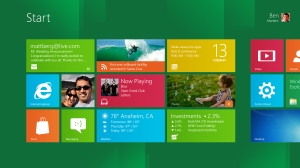Last chance for Windows
This is my editorial from the Summer 2012 issue of HardCopy magazine:
 The imminent launch of Windows 8 and Windows RT is big news. Microsoft has a real opportunity on its hands with Windows 8, but whether it is going to grasp it is far from certain. And if it does not, the company might as well leave the tablet and the phone market in Apple’s capable hands.
The imminent launch of Windows 8 and Windows RT is big news. Microsoft has a real opportunity on its hands with Windows 8, but whether it is going to grasp it is far from certain. And if it does not, the company might as well leave the tablet and the phone market in Apple’s capable hands.
As far as client-side computing is concerned, the industry has crystallised around three form factors: the desktop, the tablet and the phone. Each satisfies a different need; each makes a different demand on its operating system; and despite what anyone says, each is going to be with us for many years to come.
The phone is something most people carry with them all the time, which means it has to be small and light enough to fit in your pocket and not make you look like Dom Joly every time you take a phone call. The tablet has to be small and light enough to fit in a briefcase or reasonably-sized handbag, but above all it needs a clear and responsive display. Both need touch sensitive screens and a decent battery life.
The demands of the desktop are rather different. Here the screen can be as large as the desk can take, and certainly does not need to be touch sensitive. Instead the mouse seems a perfectly adequate control device, while every attempt to replace the keyboard over the past decades has failed.
At the moment, both Apple and Microsoft have excellent desktop operating systems in Mac OS X and Windows 7, while Apple is at a considerable advantage with iOS which runs on its highly successful iPhone and iPad devices and shares the same Darwin core as OS X. Microsoft already has a good offering in Windows Phone 7.5, and has little choice but to support its partners as much as possible. With regards to the tablet, Microsoft is doing the right thing with Windows RT by basing it on the same Metro-style user interface introduced with Windows Phone 7, but it’s got a lot of catching up to do before its hardware partners can really start competing with the iPad.
However Microsoft does have two major advantages over Apple. For a start, the vast majority of potential tablet customers are likely to have a desktop at home that is running Windows. Yes, the iPad and the iPhone do work tolerably well with Windows through iTunes (once you have mastered its eccentricities), but Microsoft has a huge advantage when it comes to ensuring that the integration between these various Windows devices can be a truly seamless and rich experience. Secondly, Microsoft has all those servers sitting in the back offices of all those corporations. Again, Microsoft can make sure that its tablet and phone solutions can be transparently managed and secured by the IT department, and capable of deep integration with the likes of SQL Server, Exchange and SharePoint.
So my message to Microsoft is to stop fooling around with the Start button and start concentrating on what’s really important.

What you say is very sensible and probably will prevail for a while yet. However, I see from your profile you’ve been around this subject for a while, so you’ve seen some changes that were not ‘more of the same’. Windows is not a cool word with the newcomers to the game and while it will have a core of users for some time yet, it’s likely to become a legacy platform in the end. IPV6 is a game changer, we can’t predict what new exploitations of it will bring to the world of applications and as yet un-thought of devices. At the moment this may be seen as a solution looking for a problem but that will change when the first smart ideas start to appear. I doubt that the ideas will be coming from people with Windows in mind.
LikeLike
Thanks for your comment – interesting points! However I don’t see major changes on existing platforms while Apple maintains such a tight hold on its software. As it is, hardware manufacturers such as Dell, Sony, Samsung and so forth have a choice between Windows or Android, and I can’t see Android on the desktop unless Microsoft really blows it. That is of course possible, and it is possible that Apple might licence other manufacturers to use iOS or Mac OS X, which would be a game changer. What I suspect will happen is what you hint at: that the innovation will happen on tablet and the phone, and on all those new devices that IPv6 will make possible.
LikeLike
Apple have shown the way with their ‘Keep it simple’ approach and attention to detail in manufacturing. All for a price that implies exclusivity as well. Android fragmentation is a problem for all concerned and will mature at some point. The users of mobile devices are really not interested in the geek arguments, they are affected by design, usability, fashion and cost. Sometimes Geek egos and the race to be first have overlooked one or more of these factors. A recent re-simplified notepad app for Android anything was a surprising success and proves my point.
Windows success was mainly due to the fact that for most businesses it didn’t make sense to be different, the printing industry with it’s special needs was the exception. There then was a period where movement of staff and skills was possible with ‘off the shelf products’ filling the skills shortage. The problem with that environment is that ‘off the shelf’ will never give you a competitive advantage, by definition. I’m talking about businesses where IT is a requirement not a product in itself. In many organisations this is still the set-up, Servers supplying the various business functions and relatively little integration with users individual apps and kit. If Windows on mobile devices is to succeed, it could do worse than concentrate on a seamless interface with it’s Server platforms.
LikeLike
Totally agree on your last point. As I said in the article, Microsoft does have a big advantage the phone and tablet because it can integrate them seamlessly into its servers – and indeed into Windows desktops. I have a Windows Phone and I really like the way it integrates with my Exchange Server account, not just email but contacts, tasks, calendar, the lot. My wife recently bought an iPad and I was surprised how badly it integrates with iTunes under Windows – and I’m not sure it would be that much better with iTunes on a Mac.
However I would have thought that if history teaches us anything here, it’s that it’s the app base that drives the platform. Windows got where it is today largely because of Microsoft Office, and largely because it has long been the default installation when you buy a non-Apple desktop. Once a non-IT organisation is tied into Office, it’s very difficult to move them on to something else.
LikeLike
The Microsoft Office bundle is indeed the Windows flagship, but how many businesses really use anything but Word and Excel? Google will chip away at the user base wherever it can. Here’s today’s effort http://googleblog.blogspot.fr/2012/06/google-quickoffice-get-more-done.html – its taken over Quickoffice.
LikeLike
Microsoft could be making a terrible mistake with Windows 8. What’s intuitive on a touch device (swiping etc) can be baffling on a non-touch one, and foisting a touch-based, consumer-oriented mobile phone interface on hundreds of millions of desktop and laptop users, while removing the basics that everyone understands, could be going way too far.
Microsoft may also find its objective of owning a big slice of the tablet market severely compromised. Coming in under the radar at the moment are a flood of sub-£200 (and, increasingly, sub-£100) tablets running Android 4.0. These are the output of the same Chinese factories that make the £300+ offerings sold by mainstream vendors, shipped by local resellers without the fat local margins. Consumer reviews for them should make worrying reading for fat-margin vendors (and OS suppliers), since a recurrent theme is “I wasn’t expecting much for this price but in fact it’s really good”. £100 throwaway tablets running productivity apps from the cloud and streaming HD video to TVs could kill the home computer stone dead, but they’re unlikely to be running Windows or iOS.
LikeLike
I agree – it seems absolute madness to think that desktop users need a touch screen, and yet that seems to be what they’re thinking.
LikeLike
If such low cost tablets become ubiquitous we don’t yet know what impact they will have on the way we operate both in business and private.
I just spent some time in Bahrain where the current approach for the Tech-savvy is to have a an account that uses a 3G Router (no landline) and use this as a WiFi hotspot so to speak allowing you access to the internet wherever you are on the island. The cost is 1BD = 2 Euros = 1.6GBP a day with a data allowance of 1GB per day. Data rates allowing streaming Video from Youtube etc are sustained. You only need a power source. There are rechargeable versions as well. So you can take your hotspot with you. I tested the speeds and achieved between 1 and 4.5 mbs.
There is certainly a feeling of ‘this is the answer what’s the problem?’ feeling about this set-up when you think about it. The temptation would be to go with putting everything on the cloud, but I’ve been around too long to ignore the single point of failure that could bring to business. I sometimes wonder if the boys and girls in Chip Valley think the Internet is a force of nature like gravity and not at the whim of interested parties at all.
LikeLike